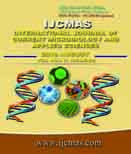


 National Academy of Agricultural Sciences (NAAS)
National Academy of Agricultural Sciences (NAAS)

|
PRINT ISSN : 2319-7692
Online ISSN : 2319-7706 Issues : 12 per year Publisher : Excellent Publishers Email : editorijcmas@gmail.com / submit@ijcmas.com Editor-in-chief: Dr.M.Prakash Index Copernicus ICV 2018: 95.39 NAAS RATING 2020: 5.38 |
The present investigation was conducted in the net house of Department of Crop Physiology at Narendra Deva University of Agriculture and Technology, Kumarganj, Faizabad (U.P.). The experiment was carried out in pot culture in complete randomized block design with three replications and six rice varieties, (Three tolerant verities-CSR 36, CSR 43, Narendra Usar 3) and (Three susceptible-Swarna Sub 1, IR 28, IR 29) under sodic soil having pH 8.5-8.6, 9.0-9.1 and 9.5-9.6. Results of the experiments indicated that relative water content in leaves and protein content in leaves showed minimum reduction in all the tolerant varieties at pH 9.5 in comparison to susceptible varieties at flowering stage of observation. Tolerant varieties have less accumulation of Na+ and maintain better level of potassium at higher sodicity levels while, reverse in case of sensitive varieties. Yield components such as number of panicles plant-1 and test weight were higher even at higher pH (9.0, 9.5) in all the tolerant varieties in comparison to susceptible varieties. CSR 36 and CSR 43 had a greater tolerance to sodic soil than IR 64 and IR 29.
 |
 |
 |
 |
 |